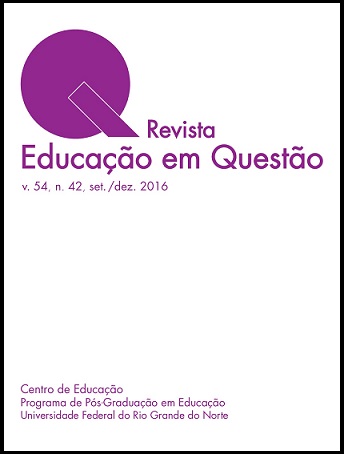School Time:
organization, expansion and qualification of school education time
DOI:
https://doi.org/10.21680/1981-1802.2016v54n42ID10953Keywords:
School Time, School calendar, Public school, High schoolAbstract
This paper analyzes the administrative and pedagogical organization of school time and assesses the discussions on the extension of the school day and the qualification of time spent in teaching in order to create better conditions for learning and well-being of all who are committed to school. The text raises some controversy and international initiatives that seek to find alternatives to promote a more adequate provision of that time in order to provide better conditions for success in teaching quality and the duration of the school day. The methodological understanding of this work in accordance with Gaussel (2013) requires the recognition of a plurality of educational time and multiple legitimate ways of learning and teaching. It takes the calendar as model of organization and management of school activities and raises some critical observations on the disposition of school time from the analysis of the calendar of a public high school of São Paulo State education system.
Downloads
References
BRASIL. Decreto-Lei no 2.848, de 7 de dezembro de 1940. Diário Oficial [da] República Federativa do Brasil, Poder Legislativo, Brasília, DF, 31. dez. 1940, p. 2391.
BRASIL. Lei nº 8.069, de 13 de julho de 1990. Dispõe sobre o Estatuto da Criança e do Adolescente e dá outras providências. Diário Oficial [da] República Federativa do Brasil, Poder Legislativo, Brasília, DF, 16 jul. 1990. Seção 1, p. 13563.
BRASIL. Lei nº 9.394, de 20 de dezembro de 1996. Estabelece as diretrizes e bases da educação nacional (LDB). Diário Oficial [da] República Federativa do Brasil, Poder Legislativo, Brasília, DF, 23 dez. 1996. Seção 1, p. 27833-27841.
CAVET, Agnès. Rytmes scolaries: pour une dynamique nouvelle des temps éducatifs. Dossier d’actualité de la VST, n. 60, fev. 2011. Disponível em: http://www.inrp.fr/vst/LettreVST/60-fev-2011.php. Acesso em: 2 maio 2015.
CHOPIN, Marie-Pierre. Le temps de l’enseignement: l’avancée du savoir et la gestion des héterogénités dans la classe. Rennes: Presses Universitaires de Rennes, 2011.
COMPÈRE, Marie-Madeleine. Du collège au lycée (1500-1850). Généalogie de l’enseignement secondaire français. Paris: Gallimard; Julliard, 1997.
EUROPEAN COMISSION. Eurydice. Recommended annual taught time in full-time compulsory education in Europe 2012-2013. 2013. Disponível em: http://eacea.ec.europa.eu/educataon/eurydice/documents/facts_and_figures/taught_time_EN.pdf. Acesso em: 25 mar. 2015.
EUROPEAN COMISSION. Eurydice. Organisation of school time in Europe. Primary and Secondary Education, 2015/2016. 2015. Disponível em: http://eacea.ec.europa.eu/education/eurydice/documents/facts_and_figures/186EN.pdf. Acesso em: 20 abr. 2015.
FRANCE. Conférence National sur les Rytmmes Scolaries. Rapport de synthèse des auditions, des débats en académie et des échanges sur internet. jan. 2011. France: Ministères de l’Éducation, Jeunesse et Vie Associative, 2011.
GAUSSEL, Marie. Aux frontières de l’école ou pluralité des temps éducatifs. Dossier d’actualité de la VST, n. 81, jan. 2013. Disponível em: http://ife.ens-lyon.fr/vst/DA-Veille/81-janvier-2013.pdf. Acesso em: 18 abr. 2015.
HEIDEGGER, Martin. Ser e tempo. Tradução de Márcia Sá Cavalcante Schubach.15. ed. Petrópolis: Vozes, 2005.
LECONTE-LAMBERT, Claire. Des rytmes de vie aux rytmes scolaires. Quelle histoire! Villeneuve d'Ascq, France: Presses Universitaires du Septentrion, 2011.
MAULINI, Olivier; PERRENOUD, Philippe. La forme scolaire de l’éducation de base: tensions internes et évolutions. In: MAULINI, Olivier; MONTANDON, Cleopâtre (Dir.). Les formes de l’éducation: varieté et variations. Bruxeles: De Boeck Supérieur, 2005.
NECTA. National Education Commision on Time and Learning. Prisioners of time. Washington: NECTA, 2005.
OCDE. Regard sur l’éducation 2010: les indicateurs del’OCDE. Indicateurs D1 et D4. Paris: OCDE, 2011.
SALDAÑA, Paulo. Escolas de tempo integral do Estado não garantem melhor aprendizado. O Estado de São Paulo, São Paulo, 5 jan. 2013. Disponível em: http://www.estadao.com.br/noticias/geral,escolas-de-tempo-integral-do-estado-nao-garantem-melhor-aprendizado-imp-,980380. Acesso em: 12 set. 2015.
SÃO PAULO. Secretaria Estadual de Educação de São Paulo. Resolução SE nº 81, de 16 de dezembro de 2011. Estabelece diretrizes para a organização curricular do ensino fundamental e do ensino médio nas escolas estaduais. Disponível em: http://siau.edunet.sp.gov.br/ItemLise/arquivos/81_11.HTM.
TOUITOU, Yvan; BEGUE, Pierre. Aménagement du temps scolaire et santé de l’enfant: vers nouvel horaire scolaire. Académie National de Médicine, Paris, v. 194, n.1, p. 107-122, 2010.
WAAUB, Pierre. Le temps d’ensigner. Loverval: Éditons Labor, 2006.
WEBER, Max. Ética protestante e o ‘espírito” do capitalismo. Tradução de José Marcos Mariani de Macedo. São Paulo: Companhia das Letras, 2004.
Downloads
Published
How to Cite
Issue
Section
License
The Journal Education in Question shall retain the copyright in all articles that it publishes.
The authors and co-authors of articles and book reviews, published in the Journal Education in Question, shall wait for at least 1 (one) year before they are allowed to submit new works for publication.






